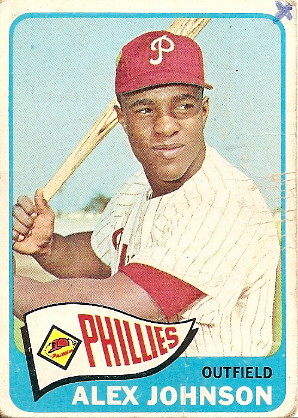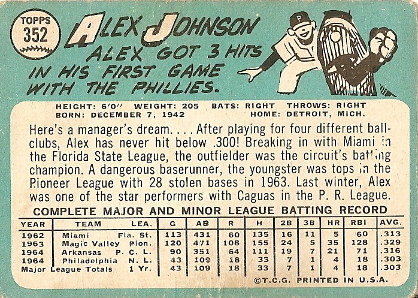
Our tour of the 1964 Phillies continues tonight with rookie outfielder Alex Johnson, whose card carries a bit of mystery with it. Who marked the top right corner with that small "x" in blue ink, and for what purpose? Perhaps the mystery vandal was calling attention to Alex's reputation as a baseball pariah. Despite his talented bat, the Detroit native's quarrelsome personality was key is his itinerancy; Johnson played for eight teams in thirteen seasons, never staying in one city for longer than two years.
Johnson tore up the minor leagues, batting over .300 in every stop and challenging for a Triple Crown in 1963 at single-A Magic Valley (.329 with a league-leading 35 HR and 128 RBI). In his third pro season, Alex got the call to Philadelphia in July 1964. It was suggested that his defense had kept him from being promoted sooner; he was jokingly referred to as "Iron Hands". The youngster hit the ground running, carrying a .400 average as late as September 4 before slumping with the rest of the team and finishing at .303. At first, he was primarily platooned, getting most of his playing time against lefties. By the end of 1965, a season in which he batted .294, he began to get into the lineup against righthanders and had even improved with the glove. But manager Gene Mauch was frustrated by Alex's attitude and a supposed lack of effort, and the outfielder was dealt to the Cardinals in a six-player trade. He was the only starter headed to St. Louis, and fetched first baseman Bill White and shortstop Dick Groat, as well as a reserve catcher named Bob Uecker.
Johnson was a profound disappointment in the Show Me State, getting demoted in May of 1966 with a .189 average. After regaining his batting stroke in the minors, he opened the following year in a right field platoon with Roger Maris. That didn't work out either, as he hit .223 with just one home run and nine walks in 81 games and didn't even play in the World Series, which the Cards won in seven games over Boston. Again, he developed a reputation for tuning out teammates and coaches, and was dumped to Cincinnati for Dick Simpson. The Reds and manager Dave Bristol took a more hands-off approach to Alex, who often bristled under the suggestions and orders of others. He was named Comeback Player of the Year in 1968 after boosting his average to .312. For an encore, he swatted 17 home runs with 88 RBI (both career highs) and hit .315. But the resurgent outfielder was on the move after another two-year stint, with the pitching-poor Reds sending him to the Angels for hurler Jim McGlothlin and two others.
In his American League debut, the well-traveled Johnson responded with a league-leading .329 average and his lone All-Star selection. Sadly, he became an even greater problem, shouting obscenities at teammates and reporters alike. Things weren't much better on the field, as he routinely failed to run out ground balls and gave a lackadaisical effort on defense. 1971 was disastrous, as Alex was frequently, fined, benched, and even suspended, and his behavior became even more erratic. He gave enigmatic responses when questioned about his substandard focus and nearly came to blows with a handful of teammates. Several baffled observers noted that the troubled player was often perfectly pleasant and outgoing away from the stadium.
As Alex's struggles with the Angels reached the boiling point, Players' Association head Marvin Miller filed a greivance on his behalf. Miller seemed to be the only one to realize that the player had an emotional disability, and claimed that the fines and suspensions levied against him were unfair. Two different psychiatrists agreed, and suggested that Johnson could resume his career with the proper treatment. An independent arbitrator agreed, and ruled in his favor (but found him liable for payment of the fines, oddly enough).
The Indians took a flier on Johnson in 1972, but his best performances were behind him. His average was up-and-down for the final five seasons of his career, which were spent with Cleveland, Texas, the Yankees, and the Tigers in that order. His 1973 season with the Rangers was a sort of last hurrah, as the new designated hitter rule freed him to focus on hitting (.287-8-68). After retiring, he returned to Motown and ultimately took over his father's truck repair and leasing company. Most of the information in this entry came from a fascinating biography compiled by SABR (Society for American Baseball Research), which you can read here.
Fun fact: Alex Johnson was not a patient hitter. In fact, he had more extra-base hits (291) than walks (244) in his career!



Excellent account of Alex's history on the ballfield. I have many of his cards. I remember him mostly for his 1971 Topps Angels card; he appears over the batting rack contemplating a selection.
ReplyDeleteSeems he had lots on his mind!